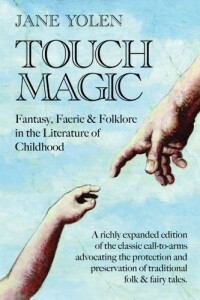 I said in a review of one of Jane Yolen’s books that my wish last Yule season “for a publisher to reprint [Jane Yolen’s] essay collection Touch Magic: Fantasy, Faerie and Folklore in the Literature of Childhood has been answered. Sometime next year August House will be doing an expanded and updated version! Any serious collector of folklore with an interest in children’s literature should have a copy of this book in her library…” Me wish has been answered as August House has now released the much expanded version of Touch Magic that I referred to in that review! This slim volume proves that good things come in small packages!
I said in a review of one of Jane Yolen’s books that my wish last Yule season “for a publisher to reprint [Jane Yolen’s] essay collection Touch Magic: Fantasy, Faerie and Folklore in the Literature of Childhood has been answered. Sometime next year August House will be doing an expanded and updated version! Any serious collector of folklore with an interest in children’s literature should have a copy of this book in her library…” Me wish has been answered as August House has now released the much expanded version of Touch Magic that I referred to in that review! This slim volume proves that good things come in small packages!
“I believe that culture begins in the cradle.” Yolen writes. “To do without tales and stories and books is to lose humanity’s past, is to have no star map for our future.” Touch Magic, which was originally published nearly twenty years ago, has rightly been called a classic in the field of the study of children’s literature. Finding a copy was a difficult task as the original edition was highly coveted. The copy we have in our library dwells beside her Tam Lin and her Wild Hunt — both classics in their own right. But unlike these novels, Touch Magic is about the making and the importance of children’s literature. As Neil Barron’s Fantasy Literature: A Reader’s Guidenotes, Touch Magic is “[a] sensitively and beautifully written account of the psychological aspects of this literature.”
What this volume is about is acting as an advocate for the preservation and protecting of traditional folk and fairy tales. It’s somewhat ironic to me that August House has decided to release this expanded version of Touch Magic in the midst of the Harry Potter fixation, as Harry Potter has come under rather bloody attack from groups on the right that object strongly to the use of magic and witchcraft within the novels. (Magic, witchcraft, and sorcery have become fashionable in the electronic media too: Buffy the Vampire Slayer, Worst Witch, and Charmed are but three of the series which have magic, witchcraft, and sorcery as part of their story — and these elements are used in a positive manner.) Touch Magicis important precisely because it explains why fairy/folk tales are important to children.
Yolen stresses that “Story is our wall against the dark.” (Aside to August House: the Christian motif on the cover of an adult hand reaching out to a child’s hand is a bit odd given that Christian groups are the groups most often actively involved in censoring children’s literature. The original cover of a jester within a capital “M” was much more appropriate to the contents of Touch Magic.) Jane Yolen notes on her Web site that Touch Magic is subtitled “Fantasy, Faerie, and Folklore in the Literature of Childhood,” and that “this small book of essays was first my position papers for the EdD I never quite got. Originally published inhardcover by Philomel and then brought out a few years later in a trade paperback, this book of essays has become well identified with me. And the phrase, ‘Touch magic, pass it on’ shows up in the oddest places.” Another interview she did in 1988 had her saying, “I wrote a book called Touch Magic, and very often, when I’m signing books, I will write, ‘Touch magic, pass it on,’ which is again the same thing as telling stories. You’ve touched this magic, pass it on: pass the book on; pass the story on; pass the tale on; pass these truths on.” One wonders if the folks that have helped spread the meme of ‘touch magic, pass it on” actually read the book, as there is much more here than an admittedly cute expression!
Fairy/folk tales have the ability to transform lives. As Jane Yolen writes herein:
Thus the oldest stories were transmitted and transmuted, the kaleidoscope patterns of motif changed by time and by the times, by the tellers and by the listeners, by the country in which they arose and the countries to which they were carried. The old oral tales were changed the way culture itself changes, the way traditions change, by an erosion/eruption as powerful in its way as any geological force.
And Jane Yolen tackles much here: the older material takes on subjects ranging from the double helix of teller and tale, tough magic, the gift of language, and the nature of once upon a time. The new section, according to Jane in her new preface, is six essays in which she converses ’bout the most important classics of children’s fantasy, i.e., the books of Beatrix Potter, her attempt to define what a story is, the morality of fairy tales, and other juicy subjects. There’s enough good — and meaningful — reading here to keep one reading for many a cold winters night. Having been admonished by one writer this week for giving too much away in my reviews, I’ll think let you discover just how wonderful Touch Magic is!
(August House, 2000)
